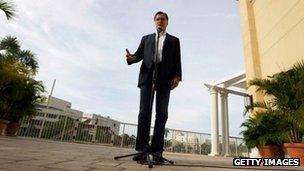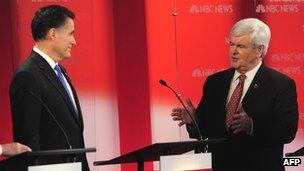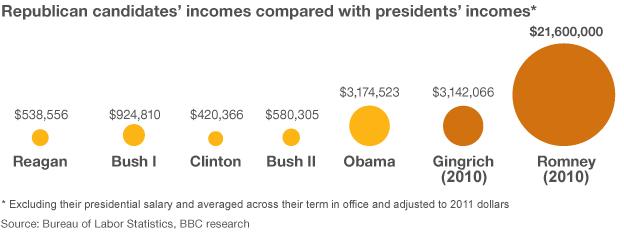Mitt Romney is very rich: Does it matter?
- Published
- comments

Mitt Romney's tax returns arrived on the same day Obama makes a major speech - on inequality
Mitt Romney pays a lot more, external than most Americans in tax, but he also pays proportionally a lot less.
He paid more than $6m (£3.8m) over two years at a rate of just under 14%. The average American pays around 11% tax, but the top rate is 35%, external.
What all this underlines is that Mitt Romney is very, very rich, earning more than $45m dollars in the last two years.
I suspect how people will see the bald facts will divide fairly neatly along party lines, at least at first.
But it underlines a damaging perception that could hurt him in a presidential election if he does end up as the Republican candidate.
Return to tax policy
First off, the good news for Mr Romney: he's squeaky clean. There is no suggestion of anything dodgy going on. As he points out, no one pays more tax than they owe.
The reason Mr Romney pays a lower rate than, say, President Obama (26%) or Newt Gingrich (over 30%) is because there's a different tax rate for income and investments.
That raises a much wider argument, and one that will be central to the election in November. It is precisely why the billionaire investor Warren Buffet said the tax rate was unfair and should be changed because he paid a smaller proportion of his income than his secretary.
Mr Obama has taken up that call with enthusiasm, even naming his proposed rule after Mr Buffet, external.
It plays in to a national debate on wealth and fairness that could be critical to Mr Obama's re-election or defeat. The president will make the idea of a fairer society, where the rich do more to help the struggling middle classes, a centrepiece of his State of the Union speech tonight.
We are told the themes will be similar to a speech a few months ago in Kansas, where he attacked opponents of any tax rise, external.
"Their philosophy is simple: we are better off when everyone is left to fend for themselves and play by their own rules," Mr Obama said.
"Well, I'm here to say they are wrong. I'm here to re-affirm my deep conviction that we are greater together than we are on our own.
I believe that this country succeeds when everyone gets a fair shot, when everyone does their fair share, and when everyone plays by the same rules."
Romney's tin ear?
Mr Obama hopes, at a time when many Americans are suffering economically, they will see this as "fairness" not "class war".
But attacks on the rich have never worked very well in America. He must hope that there is an underlying sense of resentment.

Mitt Romney and Newt Gingrich are battling for Florida after Mr Gingrich won South Carolina
I am simply not sure whether the public mood has changed or not. It is something I hope to look at when I go to Florida.
On the surface this should not make much impact on the Republican race. After all, the party admires wealth-creators and success and thinks taxation should be much lower.
It is an irony that under Mr Gingrich's tax plan Mr Romney would pay almost nothing, external.
But Newt and the others raised his tax returns for a reason. Mitt has an uncanny knack of making statements that suggest he's so wealthy that he doesn't think the same way as the rest of us.
He chortles that he forced Ted Kennedy to take out a second mortgage to run an election campaign against him. He wagered an imaginary $10,000 when most of us would have flourished a fictional hundred.
Republican voters may love multi-millionaires and lionise the very wealthy, but they don't like elites and patricians. Neither do the people who voted for them in the mid-term elections.
At the moment they don't much like bankers on Wall Street. They like their rich folk to behave as though they're are just ordinary Joes at heart.
Both Mr Obama and Newt want to paint Mr Romney as dangerous and out of touch with the mood of America. That's what's taxing Mitt.
